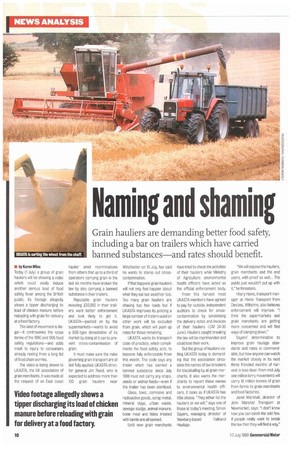a ing and sha mg
Page 12

If you've noticed an error in this article please click here to report it so we can fix it.
Grain hauliers are demanding better food safety, including a bar on trailers which have carried banned substances—and rates should benefit.
• by Karen Miles Today (1 July) a group of grain hauliers will be showing a video which could easily induce another serious bout of food safety fever among the British public. Its footage allegedly shows a tipper discharging its load of chicken manure before reloading with grain for delivery at a food factory.
This kind of movement is illegal—it contravenes the loose terms of the 1990 and 1995 food safety regulations—and adds insult to injury to consumers already reeling from a long list of food chain worries.
The video is being shown to UKASTA, the UK association of grain merchants. It was made at the request of an East coast haulier amid recriminations from others that up to a third of operators carrying grain in the last six months have broken the law by also carrying a banned substance in their trailers.
Reputable grain hauliers investing 230,000 in their trailers want better enforcement and look likely to get it. UKASTA—pushed on by the supermarkets—wants to avoid a BSE-type devastation of its market by doing all it can to prevent cross-contamination of grain.
It must make sure the rules governing grain transport are at last fully applied. UKASTA director general Jim Reed, who is expected to address more than 100 grain hauliers near Winchester on 10 July. has said he wants to stamp out crosscontamination.
If that happens grain hauliers will not only feel happier about what they eat but wealthier too. Too many grain hauliers are chasing too few loads but if UKASTA improves its policing a large number of trailers used on other work will be excluded from grain, which will push up rates for those remaining.
UKASTA wants its transport code of practice, which compliments the food safety acts, to become fully enforceable from this month. The code says any trailer which has carried a banned substance since July 1998 must not carry any crops, seeds or animal feeds—even if the trailer has been sterilised.
Glass, toxic, corrosive and radioactive goods, scrap metal, mineral clays, urban waste, sewage sludge, animal manure, bone meal and hides treated with tannin are all banned.
Until now grain merchants have tried to check the activities of their hauliers while Ministry of Agriculture environmental health officers have acted as the official enforcement body.
From this harvest most UKASTA members have agreed to pay for outside, independent auditors to check for crosscontamination by scrutinising the delivery notes and invoices of their hauliers {CM 24-30 June), Hauliers caught breaking the law will be reprimanded and could lose their work.
But the group of hauliers visiting IJKASTA today is demanding that the association circulates the names of law-breakers for blackballing by all grain merchants. It also wants the merchants to report these names to environmental health officers. It looks as if UKASTA has little choice. "They either list the haulers or we will," says one of those at today's meeting, Simon Sayers, managing director of
Newbury-based Falkland Haulage. We will expose the hauliers, grain merchants and the end users, with proof as well... The public just wouldn't put up with it," he threatens.
Hilary Hams, transport manager at Hams Transport from Devizes, Wiltshire, also believes enforcement will improve. "I think the supermarkets and grain merchants are getting more concerned and will find ways of clamping down."
Sayers' determination to improve grain haulage standards and rates is commendable, but how anyone can watch the market closely in its next three frenzied months of harvest is less clear. From mid-July one million lorry movements will carry 18 million tonnes of grain from farms to grain merchants and food factories.
Janet Marshall, director of John Marshall Transport at Newmarket, says: "I don't know how you can catch the odd few. If people really want to break the law then they will find a way."
















































































































